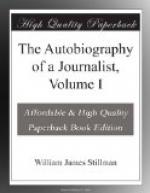When I landed, the entire able-bodied population of the North was seeking to enlist, and the troops were pouring by thousands into Washington, and only the most uncertain and prudent of the Northern leaders doubted of victory, though no one dreamed what it would cost. And, looking at the corruption of American politics to-day, the venality and the indifference to the true interests of the nation of most of the men who control the political life at its most important centres, and the general tendency of our politics, it needs a serene and far-reaching faith in human progress to enable a citizen of the United States, who believes in a political ideal, to regard the sacrifices then made as having been profitable. I see things dispassionately and as an old man removed from the chance of personal gains or losses, and, but for a faith in human progress being the result of an eternal and inevitable law, I should say that the blood of that war had been wasted. It is a painful conviction to die with,—but I expect to die with it,—that generations and unparalleled disasters must pass before my country reaches the goal its founders believed to be its destiny.
Having exhausted every appliance to open a way into the army, I made my appeal to Dr. Nott, and received by return of the Washington post my commission as consul at Rome, as I have told in a previous chapter. I went on to Cambridge to get information and advice, and, at Lowell’s, met Howells for the first time. We could, each of us, offer condolence for the other’s disappointment; for Howells had asked for Dresden and was appointed to Venice, while I had asked for Venice, intending to write the history of Venetian art. But Rome had always been given to an artist; and, though there was no salary, but fees only, it seemed to have been a much-sought-for position, and I accepted.
Leaving my wife at home, for her confinement, I sailed for England, en route for Italy, just when the capture of Mason and Slidell had thrown the country into a new agitation; for it was foreseen that England would not submit to this disrespect to her flag, though the step was in strict accordance with her own precedents. Seward and the more prudent part of the public were in favor of releasing the prisoners at once, and before any demand could be made by the English government; but it was said that Lincoln and the West were in favor of holding them, and letting England do her worst. It is possible that he thought that a foreign enemy would decide all the wavering minds, and possibly open the way to a pacification between the North and South. I left New York before we had heard of the reception of the news in England, and found the agitation there intense. The consul at Liverpool told me that he could not go into the Exchange for the insults offered him there, and American merchants were insulted on the street. In London, at the restaurants where I dined, the conversation turned altogether on the incident, and the language was most violent.




